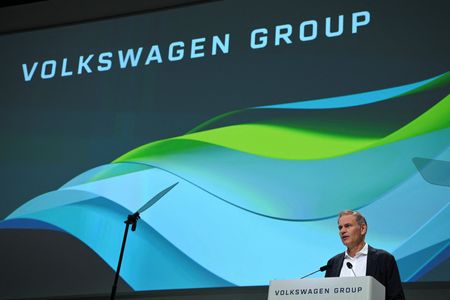 1
1 1
1
By Victoria Waldersee and Jan Schwartz
BERLIN (Reuters) -Volkswagen defended its record in China and its decision to jointly own a plant in the Xinjiang region after activists and investors lashed out at the carmaker at a volatile annual general shareholder meeting on Wednesday.
About ten activists, including one topless woman with ‘Dirty Money’ painted on her back, interrupted executives’ speeches, shouting that the carmaker’s vehicles were built with forced labour and waving banners that read: ‘End Uyghur Forced Labour’.
The United Nations said last year that China’s “arbitrary and discriminatory detention” of Uyghurs and other Muslims in its Xinjiang region may constitute crimes against humanity. Rights groups have documented abuses including mass forced labour in detention camps which China has denied.
Investors called on Volkswagen to request its joint venture partner SAIC seeks an independent external audit of the Xinjiang plant. “Volkswagen must be certain that its supply chains are clean,” said Ingo Speich, head of sustainability and corporate governance at Deka, a top-20 Volkswagen shareholder.
China chief Ralf Brandstaetter said: “We do not see any evidence of human rights abuses at the plant,” adding that the carmaker was not able to implement an audit without agreement from SAIC.
Brandstaetter visited the plant earlier this year and said on Wednesday: “I have no reason to doubt my impressions or the information available to me.”
Still, activists including Haiyuer Kuerban of the World Uyhur Congress highlighted the reports of mass internment camps and links between Volkswagen suppliers and companies with a presence there, as well as the difficulty for locals to speak openly given the state’s restrictions on free speech.
Investors also raised fears that Volkswagen was falling behind in China’s increasingly competitive electric vehicle market, with BYD outselling Volkswagen as the top passenger car brand earlier this year.
Chief Executive Oliver Blume acknowledged the fast pace of China’s electrification, and outlined Volkswagen’s strategy to hold on to its position as market leader – tailoring products to Chinese tastes and building local partnerships.
CEO DEFENDS DUAL ROLE
Some investors reiterated their longstanding criticism of Oliver Blume’s dual role as head of both Volkswagen and Porsche, and the low valuation of Volkswagen stock, which has been in freefall for the past two years with no respite since the listing of Porsche last September.
Blume said he saw “high added value” in running both companies. The chief executive also said the carmaker had a clear plan to increase its capital market valuation which will be presented at a capital markets day in June.
Meanwhile, activists from the ‘Last Generation’ climate group glued themselves to roads leading to the location of the shareholder meeting in Berlin on Wednesday and protested outside the entrance.
One activist, whose affiliation was unclear, threw a cake at Wolfgang Porsche, chairman of Porsche SE, sending bits flying in the direction of Volkswagen supervisory board Chairman Hans Dieter Poetsch as he was speaking at the podium.
All of the activists were rapidly escorted out of the meeting by security staff.
“A constructive dialogue is important. And a general meeting offers a good opportunity for this. With the exception of a few people, everyone follows the designated guidelines,” a Volkswagen spokesperson said.
(Reporting by Victoria Waldersee and Jan Schwartz; Writing by Christoph Steitz; Editing by Bernadette Baum and Elaine Hardcastle)